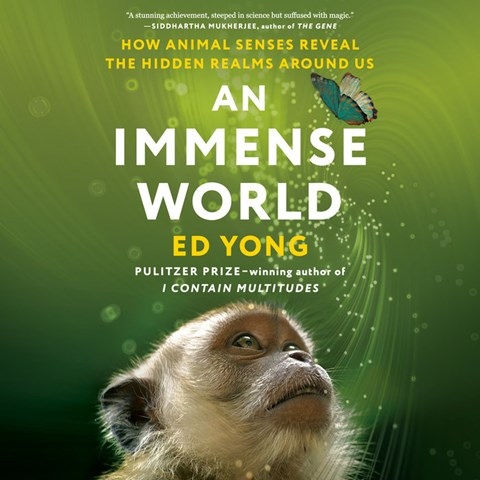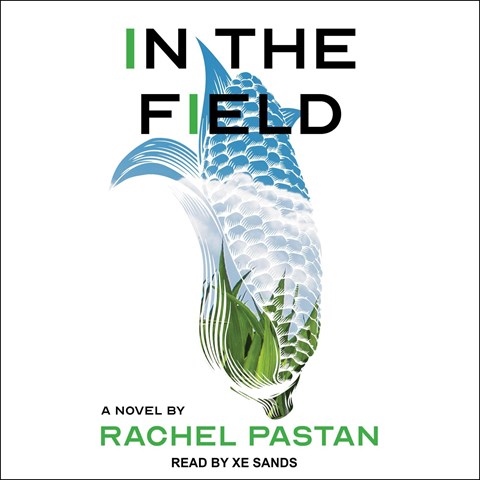 In his newest book, AN IMMENSE WORLD, science writer Ed Yong delves joyfully into the fascinating world of animal senses. He explores scent, touch, smell, hearing, and sight, as well as more unfamiliar sensory realms, such as electric and magnetic fields. Yong is undoubtedly one of the best science writers working today, and so much of what makes his work so good is apparent in his narration, which positively overflows with wonder and curiosity. It is impossible not to get as excited as Yong himself as he explains how bats use echolocation to hunt and star-nosed moles navigate by touch. His thorough, patient explanations of dozens of experiments and scientific concepts make this an accessible listen for everyone, but Yong’s obvious delight and enthusiasm transform it into something unforgettable.
In his newest book, AN IMMENSE WORLD, science writer Ed Yong delves joyfully into the fascinating world of animal senses. He explores scent, touch, smell, hearing, and sight, as well as more unfamiliar sensory realms, such as electric and magnetic fields. Yong is undoubtedly one of the best science writers working today, and so much of what makes his work so good is apparent in his narration, which positively overflows with wonder and curiosity. It is impossible not to get as excited as Yong himself as he explains how bats use echolocation to hunt and star-nosed moles navigate by touch. His thorough, patient explanations of dozens of experiments and scientific concepts make this an accessible listen for everyone, but Yong’s obvious delight and enthusiasm transform it into something unforgettable.
I listened to AN IMMENSE WORLD on long walks with my dog, while sitting on my porch listening to birds, and while working in the garden. I highly recommend listening to it outside, if you can—or even just while looking out a window. As I listened, the world around me came into sharper focus. I found myself thinking in new ways about my yard as the blue jay sees it, the path as my dog smells it, how the dirt in my garden feels to earthworms. I can still hear Yong’s voice echoing as I go about my days, reminding me that what we perceive as humans is just a sliver of the wider world, and that there are countless ways to pay attention.
 I was still thinking about this when I started listening to Sunyi Dean’s debut novel THE BOOK EATERS. Narrator Katie Erich captures the deliciously creepy atmosphere of this dark fantasy perfectly, her low voice humming with the constant undertone of danger and tension. The story follows Devon, one of the few remaining book eaters in the UK—a reclusive society of non-humans who consume books instead of food. She grows up in her family’s gothic mansion on the Yorkshire moors, eating all the proper fairytales. But when her son is born with a condition that gives him a hunger for human brains, not paper-and-ink stories, she sets off on a dangerous quest to find the medicine that can save his life.
I was still thinking about this when I started listening to Sunyi Dean’s debut novel THE BOOK EATERS. Narrator Katie Erich captures the deliciously creepy atmosphere of this dark fantasy perfectly, her low voice humming with the constant undertone of danger and tension. The story follows Devon, one of the few remaining book eaters in the UK—a reclusive society of non-humans who consume books instead of food. She grows up in her family’s gothic mansion on the Yorkshire moors, eating all the proper fairytales. But when her son is born with a condition that gives him a hunger for human brains, not paper-and-ink stories, she sets off on a dangerous quest to find the medicine that can save his life.
With its body horror and general eeriness, this book makes a great October listen. There are some truly excellent chase scenes, which Erich narrates with breathless intensity. She gives the various powerful and violent men in Devon’s life slick, oily voices that highlight their treachery. When voicing Devon’s young son Kai, who has consumed human minds, she switches among accents and tones, reflecting the jumble of memories and personalities that live in Kai’s brain.
But beyond all the action and adventure, THE BOOK EATERS is a thoughtful meditation on perception and attention. Book eaters are discouraged from reading, something Devon was punished for as a child. She often muses on the difference between the knowledge she gains from eating books vs. reading them. Her senses are not exactly human—paper, words, and ink have specific tastes and textures. All of these sensory details made me think differently about my own senses and how I use them to pay attention—or not.
 Paying attention—carefully, determinedly, and for as long as it takes—is also a theme in Rachel Pastan’s beautiful historical novel IN THE FIELD, inspired by the life of Nobel Prize-winning scientist Barbara McClintock. Narrator Xe Sands perfectly captures Pastan’s protagonist Kate Croft, who falls in love with science as an undergrad at Cornell in the 1920s. She devotes her life to studying corn genetics and heredity, despite endless ridicule and gaslighting from her male colleagues.
Paying attention—carefully, determinedly, and for as long as it takes—is also a theme in Rachel Pastan’s beautiful historical novel IN THE FIELD, inspired by the life of Nobel Prize-winning scientist Barbara McClintock. Narrator Xe Sands perfectly captures Pastan’s protagonist Kate Croft, who falls in love with science as an undergrad at Cornell in the 1920s. She devotes her life to studying corn genetics and heredity, despite endless ridicule and gaslighting from her male colleagues.
IN THE FIELD feels like several novels rolled into one: a fascinating window into genetics research in the 1930s and 1940s; a beautiful sapphic romance; and an intimate, if infuriating, story about what it’s like to be a woman in a male-dominated field. But more than anything else, it’s a book about Kate’s love of and dedication to her work. This is where Sands’s narration truly shines. She describes the details of Kate’s experiments in a low, reverent voice, channeling the overwhelming wonder Kate feels as she uncovers more and more of the natural world. Sands is careful delivering the words, giving weight to each one, making every slide Kate examines under the microscope and every ear of corn she touches feel like a life-changing discovery. Her voice has a beguiling power that makes it feel like you’re right there with Kate, in the lab and in the field, where every color, shape, and texture holds meaning, where there is so much to pay attention to and so much to learn.





